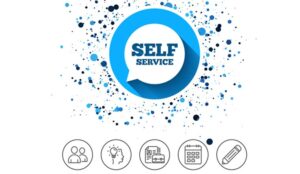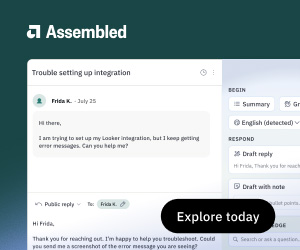KMS Lighthouse discuss the value of customer self-service portals in the digital transformation.
Over the years, customer service has gradually made a shift from: “How may I help you?” to: “I’d like to help myself.” The digital revolution has played a huge role in this transformation:
- 81% of customers first try to take care of matters themselves before contacting a live agent (Harvard Business Review).
- Over 90% of adults frequenting the internet use search engines to find answers (Harvard Business Review).
- Three out of four consumers say they’ve used a self-service portal (Microsoft).
To keep their customers happy, brands are increasingly moving to self-service models that predict and provide answers to support questions.
Self-service portals are designed to answer a customer’s question on the first attempt.
Solutions can be found in a knowledge base, community and/or user forums, chatbots, video tutorials, FAQs, and other helpful venues.
The Value of a Customer Self-Service Portal
Nearly 90% of US consumers expect brands to have an online self-service portal. That alone is enough reason for any organization to implement a self-service web portal.
For customers, an online self-service portal provides instant access to information that’s personalized to their specific needs. But there are plenty more advantages to self-service portals than customer demand alone.
Other benefits include:
- A one-stop, centralized source of information – No more clicking through to separate manuals, FAQs, and other support, products, and company information
- 24/7 access to support – No more waiting for “hours of operation”
For businesses, self-service support:
- Decreases total ticket volume
- Provides scalable customer relationship management
- Reduces customer support costs
- Reduces the amount of time agents spend on simple tickets
Elements of an Effective Online Customer Portal
For a self-service portal to be useful to customers and your business, it must be continually developed and managed. Specific components vary according to company needs, but these four elements form the foundation of a solid portal:
- Creating a sense of community with customers by including company communications within the portal – The goal is to get customers to use the portal consistently. From updated product information to company news, your online portal is a terrific way to stay connected.
- Easy search options – Allow customers to search across all files, discussions, support documents, and access other information in your portal.
- Peer-to-peer communities also help grow your knowledge base – Customers can learn from other customers who’ve experienced the same problem or have the same question.
- Segmenting information recognizes not all customers are at the same stage – Individuals need different amounts of information. Recognizing this distinction and making the available information more relevant to the customer search translates into happier, more loyal customers.
Optimizing AI-Powered Knowledge Management
New ideas, technologies, and metrics demand changes in how customer contact centres are run.
A recent study found from Voxbone AI-powered knowledge management is one of the top priorities in developing an effective call centre strategy.
Why? Because far too often there are multiple sources of “truth” that make it difficult to consistently give customers the information they need.
An AI-driven knowledge base handles mechanical tasks such as:
- Flagging outdated information
- Identifying the most frequently searched words and phrases by customers and agents
- Measuring positive or negative customer experience outcomes
Modern AI solutions are playing a key role in helping teams more effectively discover and maintain company knowledge while producing more accurate reports on the productivity and financial benefits of your knowledge management strategy.
The Bottom Line
Author Blake Morgan devoted an entire article to how important the customer experience is to a successful digital transformation. Her takeaway? “Digital transformation is the future of customer experience, and companies that don’t embrace changing technology could get left behind.”
A self-service portal gives control to your customers and allows them to interact with your business on their terms.
At the same time, it unburdens call centre agents from routine tasks so they can help solve more complex issues. It’s a win-win solution for digitally savvy customers and employees alike.
Author: Guest Author
Published On: 23rd Apr 2021
Read more about - Guest Blogs, KMS Lighthouse





































